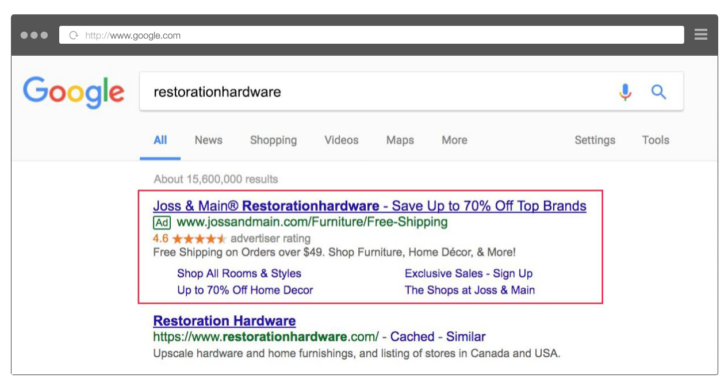30-second summary:
- Let’s admit it, the line between paid search and organic search is getting blurred.
- A lot of businesses simply assume that paying more than the competition assures a piece of the most trusted real estate in Google and Bing’s SERPs.
- While an aggressive paid strategy can certainly get you a piece of it, too often brands overlook the equally important defensive strategy of paid search monitoring.
- CEO of BrandVerity, Dave Naffziger, helps you learn the essential techniques for maintaining your position one in paid search listings.
What’s the best way to ensure your brand is at the top of the Search Engine Results Page (SERP) for a branded search? For many, the answer seems pretty straightforward — simply pay more than the competition. And while an aggressive paid strategy can certainly get you a piece of the most trusted real estate in search, too often brands overlook the equally important defensive strategy of paid search monitoring.
With brands investing unprecedented amounts into paid search, and the line between organic and paid listings becoming even more blurred, it’s more important than ever for organizations to keep a watchful eye over their campaigns in order to defend them from unscrupulous third parties, infringing ads, poor customer experience and resource drain.
Understanding the basics
On the surface, paid search monitoring is what it sounds like. It involves actively watching to see who is bidding, how often they are advertising, and when infringing ads are identified, removing them by notifying search engines or contacting the party responsible for the ads.
However, unless you are well-versed in search engine trademark rules, it can be tricky to tell the difference between an infringing and compliant ad. And in many cases, an ad may be allowed by search engines but can run counter to a brand’s partnership and affiliate agreements.
All major search engines allow brand bidding — where a partner or even a competitor bids on your branded terms. The search engines also permit trademark use in paid ads that go to legitimate resellers or informational websites.
The two main rules that limit trademark term use in paid search
1. Trademark terms may not be used in the text or title of an ad
Trademark terms may not be used in the text or title of an ad if the ad takes the user to a site where it is unclear if the advertiser is a reseller or an informational site.
In the example below, the Yahoo search engine is using the VRBO trademark to divert traffic. Someone could easily click on the ad thinking they are going to VRBO. But the ad takes you to a Yahoo search engine results page, with more ads, thus providing a poor user experience for the consumer looking to book through VRBO.

This is a textbook example of search arbitrage, which happens when an ad primarily leads to additional ads. The arbitrager pockets the difference between what they paid for the traffic and what they get paid for the ad clicks. This type of ad should be submitted to the search engine for a take-down.
2. You can’t use trademark terms in ad texts or titles in a competitive way
In the example below, Joss & Main, a competitor to homeware brand Restoration Hardware, bid on the term “restorationhardware.” Customers looking for Restoration Hardware’s homepage may mistakenly click on the ‘Joss & Main advertisement’ at the top of the SERP and find themselves on a different website than they intended.

This is the type of competitive use of a trademark that Google and Bing don’t allow, and this ad would also be subject to removal.
Taking steps to protect your position
Once you understand what trademark infringements look like, you need to establish a process to find them. Teams can do this manually by searching a list of priority keywords across several search engines once a week, and then contacting the trademark abusers directly or submitting take-down requests manually to search engines.
While this is certainly a good step to take, since many infringers use evasive techniques like geotargeting (running ads in locations where the advertiser believes the merchant won’t see them) and dayparting (setting ads to run during times of day when they believe the merchant won’t monitor them), manual monitoring can be time-consuming and ineffective. This is where automated solutions can help find and take action on trademark infringements at scale.
Another critical step that can help you defend your numero uno spot
Another critical step that teams can take is establishing and enforcing clear partner and affiliate agreements. Documenting what you will and won’t allow these various parties to do will help you stay consistent in how you handle violations and will reduce trademark infringement and affiliate abuse.
Protecting your investments and relationships
Branded keywords are the most valuable and highest converting search traffic, making them a tempting target for partners, competitors, and third parties to run ads on. However, when they don’t play by the rules bad actors can drive your cost-per-click through the roof and run your clickthrough rate into the ground. Aside from impacting your campaign ROI, these actions also negatively impact your customer experience.
Search is the front door to your brand online. How customers find you on the SERP impacts the overall customer experience, and ultimately, your bottom line. It’s simple. Customers who can easily find your brand after a branded keyword search are more likely to buy your products and services, while those that unwittingly click on a competitor or partner’s website at the top of the page are less likely to buy directly from you.
By taking the appropriate measures to defend their SERP position, brands can optimize online investments, strengthen relationships with good partners and safeguard their customers’ online experiences.
Dave Naffziger is the CEO of leading online brand protection company BrandVerity.
The best-kept secret to maintaining and defending the top spot with paid search

